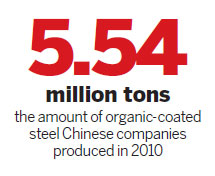EU trade investigation likely to hurt makers of organic coated steel

BEIJING - At a time that the European Union has begun an anti-subsidy investigation into China's exports of steel products, Chinese companies are contending with an oversupply of such products in their domestic market, said analysts.
They said many such companies have come to depend on overseas sales and therefore are at risk of being harmed by the trade dispute.
On Wednesday, the EU officially began investigating whether Chinese makers of organic coated steel have received government subsidies. To protect European producers, the organization threatened to impose tariffs on Chinese imports of the metal.
Europe is the main export destination for Chinese producers of organic coated steel, which would be vulnerable to harm if Europe decided to take tough actions against Chinese manufacturers, said Xu Xiangchun, a senior analyst at Mysteel.com, a steel industry website and consultancy company.
He said China's exports to Europe of this kind of steel have increased quickly in the past three years, pushed both by an increase in the country's production capacity and an oversupply in the market.
According to China Iron and Steel Association statistics, China produced 5.54 million tons of organic coated steel in 2010, of which 3.05 million tons were for export.
In the first 10 months of 2011, the country exported 4.56 million tons of organic coated steel, 49.5 percent more than the total amount for the previous year.
Xu said it is still too early to estimate how badly Chinese producers will be harmed if the punitive tariffs are imposed, saying it is best to avoid becoming too dependent on overseas markets.
He said the China Iron and Steel Association is helping the steel companies that will be affected by the EU's investigation prepare for the approaching legal process.
Organic coated steel is mainly used in home appliances, construction materials, heating equipment and furniture.
Chen Xinmiao, another industrial analyst, said European countries and the United States often set up trade barriers to curb imports of organic coated steel. Regulators there sometimes require producers to meet strict environmental standards before they allow the metal to be sold in the regions.
Chinese companies have tried to seize their opportunities to develop high-quality products and sell them in the international market.
Of the organic coated steel that China exported, only 15 percent went to the EU. That percentage decreased further in the second half of 2011, in part because of the gloomy economy in Europe. If the EU imposes tariffs on Chinese exports of the steel, Chen said Chinese companies must seek out new markets for the product.
Meanwhile, the economic growth that is occurring in Southeast Asia is not likely to proceed quickly enough to give rise to the demand needed to soak up China's oversupply of organic coated steel in a short time.
The EU therefore remains an indispensable market for Chinese producers.
Angang Steel Co Ltd, a State-owned steelmaker, said it does not make a lot of organic coated steel.
Tang Hanming, manager of the pre-painted galvanized steel department at Mysteel.com, said 246 production lines now make organic coated steel for about 100 companies in China. About half of those lines, though, are now not in operation because the market is oversupplied with the product.
"Fewer than 20 of those companies have the qualifications to export products to the overseas market and they will be the ones mainly harmed by the anti-subsidy investigation."
China Daily
(China Daily 02/23/2012 page15)








